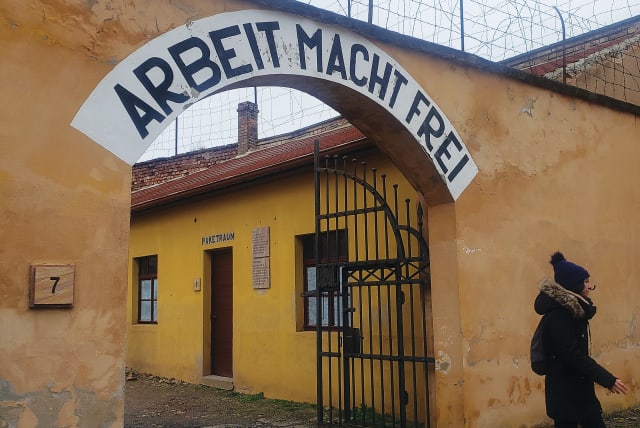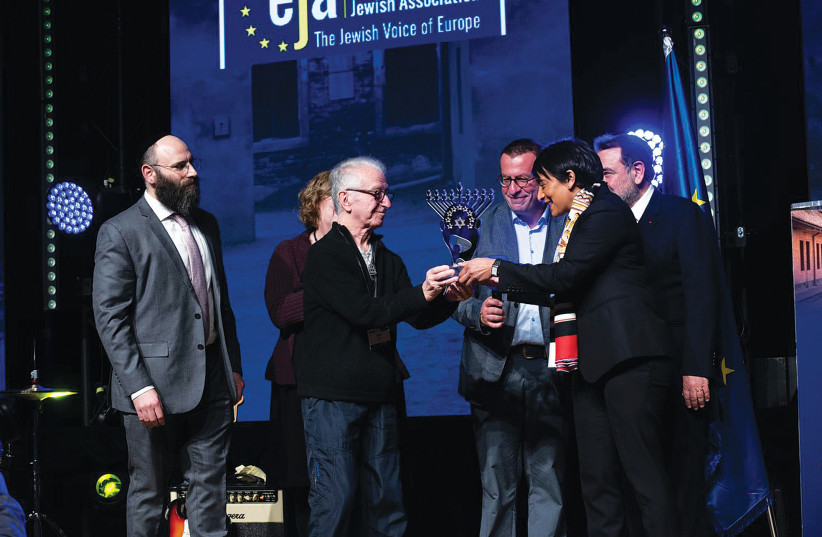Lessons on antisemitism, anti-Zionism, the Holocaust at Theresienstadt

EUROPEAN AFFAIRS: Officials and Jewish leaders gathered in Prague and Theresienstadt to discuss fake news, conspiracy theories and antisemitism.
The spread of misinformation, or what we now call “fake news,” is one of the most dangerous cultural phenomena of our time and a particularly effective tool for those wishing to spread fear and hatred of Jews. It is, however, not a new invention.
This is what the European Jewish Association aimed to convey to a delegation of European parliamentarians and diplomats with a chilly and chilling visit to the Theresienstadt Ghetto and concentration camp on January 24, just a few days before International Holocaust Remembrance Day.
Over 100 members of parliament, government officials, ambassadors and European Jewish leaders gathered in Prague and in the Theresienstadt camp to discuss ways of dealing with fake news and conspiracy theories against Jews in the media and social networks and with the rise of antisemitism in European universities.
The Theresienstadt concentration camp was designed by the Nazis to be a model of Jewish resettlement. The buildings were well-kept, and the residents were encouraged to create and consume art in the forms of poetry, theater and visual art – some of which can still be seen today at the Terezin Ghetto Museum. Unfortunately, the reality behind the cheerful facade was much grimmer. Of the more than 140,000 Jews imprisoned at Theresienstadt, nearly 90,000 were transported to death camps and killed, and over 30,000 died in Theresienstadt itself of starvation and sickness.
A tour of the Jewish Quarter
On a snowy Monday morning, the European delegates were treated to a tour of Prague’s old Jewish Quarter, now the site of one of its most upscale neighborhoods. They saw the Old New Synagogue, where the Golem of Prague is rumored to lie at rest in the attic, as well as the Old Jewish cemetery, where the Golem’s creator, Rabbi Judah Loew, also known as the Maharal of Prague, is buried.
The delegates’ outing was followed by a conference during which European officials heard the firsthand testimony of Gidon Lev, Holocaust survivor and TikTok viral sensation, who spent several years of his childhood in the Theresienstadt camp: “‘Arbeit Macht Frei’ is one of the most cynical Nazi atrocities: you are free when you are dead. The fight against antisemitism and combating hate against Jews and any other minority is something we can and should all do.”
Alex Hearn, the director of Labour Against Antisemitism, a British organization, gave a persuasive and dynamic presentation at the conference about how antisemitic fake news about Jews is actually a millennia-old phenomenon. He demonstrated that antisemitism goes beyond the political Right and Left; it is a tool to accrue power.
In their various speeches and panel discussions, European elected officials voiced their commitment to fight antisemitic fake news.
Prisca Thevenot, a member of the French Parliament and spokeswoman of the Renaissance Party (President Emmanuel Macron’s party), said: “Truth is no longer based on scientific facts but on viral and social medias. Things are going faster. We must fight against false items that are appearing quickly on our phones. Macron was presented himself as a puppet of the Jewish people because he is a former banker and has money. Fake news is using the same tropes against the Jews, time and time again. We must fight against every [instance of] fake news. If we don’t fight it, it spreads and spreads very quickly.”
MP David Stogmuller from Austria added regarding social media: “We have to understand that social media works extremely fast. It is not enough to make laws to keep up with technological challenges; we must be quick to ban illegal social media hate speech.”
Sigmount Königsberg, antisemitism commissioner of the Jewish community of Berlin, cautioned: “If we allow the enemies of democracies to shout, then we risk the end of democracy. Antisemites must be made to feel that they have no chance and that they will be made to pay the consequences.”
The kids are alright
The final panel of the conference consisted of four European Jewish students and recent graduates who are active in their communities in different ways. The panel was moderated by Yvonne Penkavova, who also guided the tour of Jewish Prague, and is a master’s student at Charles University.
She spoke with Gabriela Tultschin, a university student living in Munich, David Fiorentini, the president of the Italian Union of Jewish Students, and Juan Caldes Rodriguez, a recent university graduate from Spain who currently works on the EJA’s Diplomatic Council.
Rodriguez, who was born and raised Catholic, and discovered his Jewish heritage as a young man, stated that, unlike the Czech government, which has a long history of friendship with the State of Israel, the Spanish government is not pro-Israeli at all. He touched on the news that the city of Barcelona is considering terminating its twin-city partnership with Tel Aviv, and explained that the antisemitism he faces from his peers is largely rooted in anti-Zionism.
Fiorentini, on the other hand, felt that there is not a very strong anti-Zionist or antisemitic presence among young Italians. The main issue he faces is ignorance; most people simply have not met a Jew and therefore their only knowledge of the Jewish people comes from myths and prejudices picked up from the culture or the media. He and his peers have begun educating young people in person and online so that they might think more critically when they encounter antisemitism or anti-Zionism.
Tultschin’s concerns are more overtly political. Her university and many others in Germany, she explained, keep themselves apolitical as a matter of policy. This creates a culture among the students in which they don’t want to engage in any type of political discourse at all.
Tultschin also expressed dissatisfaction with young German Jews’ knowledge of their own culture and history. “Not everyone needs to be an activist,” she said, “but they should have the knowledge and skills for it.”
These hardworking, passionate young people instilled a glimmer of hope in the conference participants for the future of European Jewry and European Jewish activism amid a sea of depressing news stories and statistics about the state of antisemitism today.
Later that evening, EJA chairman Rabbi Menachem Margolin awarded the prestigious King David Award to Amanda Rajkumar, executive board member for Global Human Resources, People and Culture of Adidas, for the company’s decision to sever all commercial ties with singer Kanye West following his antisemitic statements.
Rajkumar reinforced her condemnation of West’s actions, saying: “We have [a] responsibility to influence and take action. The hate speech of our former partner [Kanye West] was unacceptable, and although we are not always right, this time we made the right decision. We will continue supporting Jewish communities and stand for love and against all forms of hatred, racism and discrimination.”
A trip to Theresienstadt
Early Tuesday morning, the European delegates boarded buses to the Theresienstadt camp. They saw the horrible conditions in which the prisoners were forced to live. They saw the haunting works of art and literature produced by children and adults in the camp and preserved in the on-site museum. They saw the crematorium, which was built when the number of dead exceeded the capacity of the cemetery. And perhaps they did not notice or understand enough for it to break their hearts, but they also saw the stones placed atop the incinerators, honoring the memories of those who never got a grave site, whose tired bodies were not granted the dignity of a burial.
“We believe that... the people who came here today showed their commitment to combat antisemitism,” Margolin said to The Jerusalem Post of the elected officials who joined the pilgrimage to Terezin. “We intend to work with them on different legislation in order to ensure the future of Jewish life in Europe.... We intend to contact all of those politicians right after the conference to... translate their feelings into actions.
“I believe that [for] people who come here and see where the final stop of the hatred [is], it will make a difference in their commitments, and we are very much optimistic that they will be good partners and colleagues for all of us.”
Asked for his reflections as a survivor of Theresienstadt, Lev was his typical charismatic and optimistic self, telling the Post: “I am at a point where I feel we have to learn from history and build a better future. You, the young people, have to make it better. But in order to make it better, you have to know what took place, how it took place, how it came about that people like Mussolini and Hitler were given so much power to do so much destruction. And we must be aware and fight it in any and every way possible. Make the world a better place!”
Julie Gray, Gidon’s partner and manager, expanded on his point. She cited the slogan of the Aronson archives at the International Center for Nazi Persecution: “The reasons for persecution are not a thing of the past.”
“If Jews want allies, we have to also be allies.... You have to look at other groups being terrorized and be an ally. When people think about the Holocaust, they think about the Jews – okay, that was the largest targeted group. But if you were a political dissident, if you were gay, if you were an intellectual, [you were targeted, too.]”
“Not far from here there is a town called Lidice,” Gray told the Post. “Lidice was a Czech village which was the subject of a Nazi retribution. They destroyed the whole village because they thought that some members of the Czech resistance lived there.... They drove to the village in the middle of the night, made everybody come out of their houses, and shot them in lines of five with a mattress behind them. And then they blew up the whole town. They bulldozed it, they rerouted the river, they dug up the cemetery. And these are not Jews.”
Gray concluded: “These MAGA [Make America Great Again] people – you think you [would be safe] if you cross [former US president Donald] Trump? Fascism doesn’t give a s***.”
Dr. Thomas Feist, representative of the German state of Saxony, expressed to the press his strong conviction that all German students should visit concentration camps, and, in particular, that those in his district should visit Theresienstadt, as it is only an hour’s drive from Dresden.
“And,” he concluded, “we are not only fighting the rising antisemitism; we are also fighting the rise in anti-Zionism.”
THE SOLEMNITY of the visit to Theresienstadt contrasted starkly with the agitated, urgent tone of the conference. One was a reflection of the past, while the other looked toward the future.
“We would like to live in Europe,” Margolin emphasized to the press just before the conference began on Monday. “We would like to stay in Europe. We want to contribute to society.”
All too easily, American and Israeli Jews forget that the fact that their grandparents left Europe does not mean that is the best or only option for European Jews facing adversity. Wanting to stay in Europe is a foreign concept to most of them, and it is one that Americans and Israelis would do well to keep in mind.
Jerusalem Post Store
`; document.getElementById("linkPremium").innerHTML = cont; var divWithLink = document.getElementById("premium-link"); if (divWithLink !== null && divWithLink !== 'undefined') { divWithLink.style.border = "solid 1px #cb0f3e"; divWithLink.style.textAlign = "center"; divWithLink.style.marginBottom = "15px"; divWithLink.style.marginTop = "15px"; divWithLink.style.width = "100%"; divWithLink.style.backgroundColor = "#122952"; divWithLink.style.color = "#ffffff"; divWithLink.style.lineHeight = "1.5"; } } (function (v, i) { });

